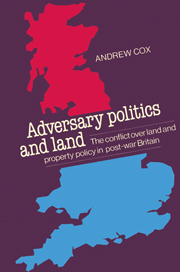Book contents
- Frontmatter
- Contents
- Preface
- PART A INTRODUCTION
- PART B THE PROBLEM OF LAND AND PROPERTY IN BRITAIN AND THE EFFECTIVE LIMITS ON GOVERNMENT POLICY INITIATION
- PART C THE HISTORY OF ADVERSARIAL POLICY FAILURE IN LAND AND PROPERTY IN POST-WAR BRITAIN
- 4 Labour, the 1947 system and the collapse of the development market (1945—1951)
- 5 The Conservative free market approach and the 1950s property boom (1951—1964)
- 6 Labour, the Land Commission and the problems of implementation (1964–1970)
- 7 The second failure of the Conservative free market approach and the 1970s property boom (1970–1974)
- 8 Labour and the failure of the Community Land Act (1974–1979)
- PART D CONCLUSION
- Notes
- Index
6 - Labour, the Land Commission and the problems of implementation (1964–1970)
Published online by Cambridge University Press: 29 September 2009
- Frontmatter
- Contents
- Preface
- PART A INTRODUCTION
- PART B THE PROBLEM OF LAND AND PROPERTY IN BRITAIN AND THE EFFECTIVE LIMITS ON GOVERNMENT POLICY INITIATION
- PART C THE HISTORY OF ADVERSARIAL POLICY FAILURE IN LAND AND PROPERTY IN POST-WAR BRITAIN
- 4 Labour, the 1947 system and the collapse of the development market (1945—1951)
- 5 The Conservative free market approach and the 1950s property boom (1951—1964)
- 6 Labour, the Land Commission and the problems of implementation (1964–1970)
- 7 The second failure of the Conservative free market approach and the 1970s property boom (1970–1974)
- 8 Labour and the failure of the Community Land Act (1974–1979)
- PART D CONCLUSION
- Notes
- Index
Summary
Labour in opposition: adversary politics and the Land Commission. The power of initiation: the struggle for the Land Commission (1964–1967). The power of constraint and the problems of implementation (1967–1970).
In this chapter the second attempt by the Labour Party to resolve the compensation and betterment problem is outlined. It is argued that in opposition there was insufficient attention paid to the constraints which any interventionist policy might experience in implementation. This is explained in terms of the adversarial reaction by the Party to the apparently doctrinaire approach taken by the Conservative government after 1959. In office civil servants forced the Party to recognise that their adversarial based approach was unworkable, and that an attempt to implement any commitment to public purchase of all development land would create disruption in the housing market. This was accepted by Labour – revealing its willingness to modify doctrinaire policies in office more quickly than its Conservative predecessor. A debate did develop, however, between those who felt that the original commitment to outright public ownership should be provided for in the 1967 Act and those who felt that a more limited approach, to assist the private and local authority development system, was all that was needed.
Neither side was able to impose its wishes on the other and a compromise – the 1967 Land Commission Act – was created. This was something of a defeat for senior civil servants who had tried to convince Labour of the need for a more limited approach. Labour ministers were able, therefore, to dominate policy initiation, but officials (supported by Richard Crossman) were able to impose sufficient limitations on the scheme to ensure that it would not fulfil a dominant role in the market.
- Type
- Chapter
- Information
- Adversary Politics and LandThe Conflict Over Land and Property Policy in Post-War Britain, pp. 125 - 154Publisher: Cambridge University PressPrint publication year: 1984



